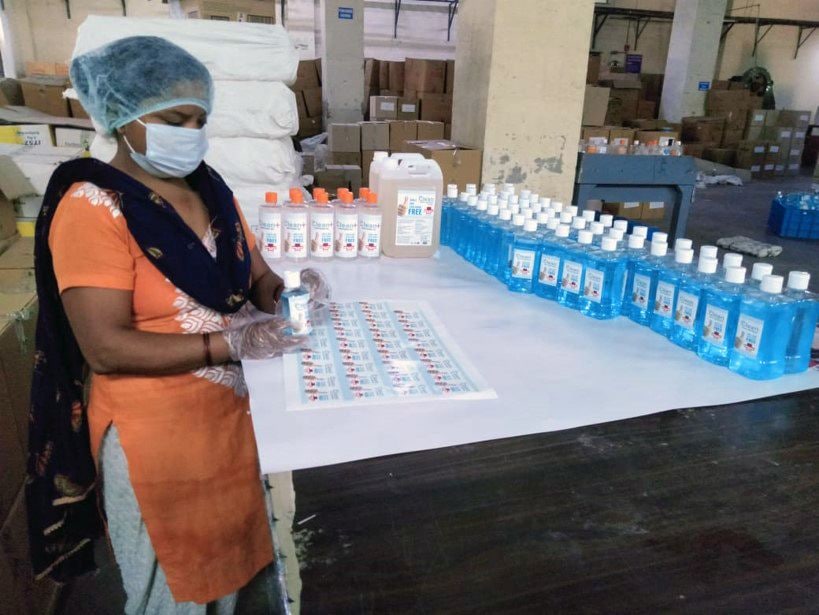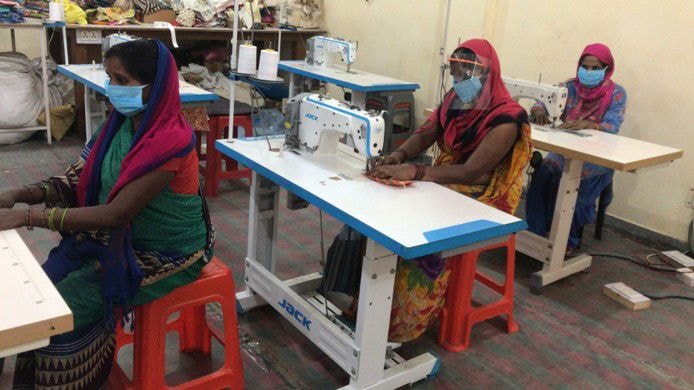Babita Gupta and Shivani Agarwal refused to give up on their dreams and employees during the COVID-19 lockdown. This is how they survived and thrived.

What do you do when an unexpected pandemic and lockdown shutter your business? You adapt, evolve and, sometimes, have a stroke of good fortune. Like these two women did.
SHIVANI AGARWAL
The founder of Scraft Products added new products to her portfolio
Everything had been going great for Delhi-based businesswoman Shivani Agarwal. Her factory in Sonipat, Haryana, was operating to full capacity making tissue papers, toilet and kitchen rolls, besides aluminum foil for food packaging. Expecting her first child this year, the 35-year-old was in expansion mode both personally and professionally.

Shivani Agarwal.
Then coronavirus began to make news headlines with increasing frequency and Shivani knew she’d have to do something about it before it was too late. Remarkably, she managed to change direction, continue production, and save her employees’ jobs even as the lockdown ravaged the rest of the Indian economy.
The founder of Scraft Products had set up her factory in 2009 after completing her MBA from Mumbai. Things had never been easy for her despite her businessman father’s support: “As a young woman, I was never taken seriously by others at home or even in the business; they’d ask to speak to someone ‘senior’ before striking a deal,” she narrates.
Yet she managed to build up her business, expanding her product range, and touched `Rs 50 crore turnover last year. Then COVID hit. “Everything was in shams,” she recalls, of how orders for her usual range fell to record lows in March, and she considered shutting down until the end of the lockdown.
But something triggered Shivani to give it one more shot. A wholesale supplier to Walmart, Shivani had enrolled herself in their Vriddhi programme launched late last year to prepare small businesses and MSMEs to participate in the domestic and global supply chains. With their mentorship, she quickly developed hand sanitisers and disinfectants wipes as per COVID product specifications, and luckily had her samples ready just one day before the nationwide lockdown was announced by Prime Minister Modi.
“I was already communicating with people via video conferencing due to pregnancy, so the sales and management process continued the same way post-lockdown,” says Shivani with some relief. With tissue paper, hand sanitisers and disinfectant wipes all classified as essential goods by the government, her factory did not have to shut for even a day, and none of her 150 employees lost their jobs. They were simply trained and moved to new departments. Scraft offers products in six basic categories, priced from Rs 15 to Rs 500 per item.
“Supply-chain disruptions and procurement of raw materials and work passes were some of the initial hurdles and they continue to exist. However, the thought that I am able to support in the supply of essentials during a crisis and provide livelihoods to my workers didn’t let me give up,” she says.

Corporate and retail orders began to flow in as India geared up to face the pandemic. Most state governments have made hand sanitisers compulsory in offices, banks, and other workplaces, and so these items have been flying off shelves. Among the first to match global specifications, Shivani is now looking at supplying worldwide.
“COVID is here for the long-run and this is the new way of life,” she says of the need for hand sanitisers and disinfectants. “We’ll continue doing these products now, in addition to our existing portfolio. If things go steady, we will be able to maintain our per-month revenue despite the lockdown and its challenges,” she smiles.
BABITA GUPTA
The textile manufacturer began producing face masks in wholesale
Bursting with optimism and spirit, Babita Gupta has the ability to see the silver lining in any situation, even a pandemic. “Crises give us opportunities for evolution and growth. Earlier, we were all on auto-pilot. Now we are in the driver’s seat,” says the 46-year-old textile manufacturer and mother of two.

Babita Gupta.
Her 13-year-old company Sarangi Creations, based in Sonipat, had been supplying home furnishings, fabric and textiles to domestic and international markets until the COVID crisis hit. Looking for ways to keep the business running, and noticing the growing demand for face masks, she resumed operations at her factory, except this time, they began making cotton face masks instead of their usual ware. She secured her first wholesale order of 80,000 masks recently.
Born into a traditional Baniya family in Delhi, Babita, who is a graduate from Hindu College in Delhi University, was a homemaker for the first few years after marriage. In an effort to help her domestic helper who faced violence at home, she asked her businessman husband Narender – who was partner in his family’s textile business – to give the girl some odd jobs that could be done at home.
“From one to 20, I soon had all these domestic helpers sitting in my balcony cutting threads from finished cushion covers and pouches,” she says with her characteristic effervescence. That’s when Babita decided to do more, and joined a Walmart programme for women entrepreneurs in 2015-16. It gave her the idea and confidence to run her own venture.
But her family was not as supportive. So Babita took matters in her own hands, sold off her jewellery, took a loan with her home as collateral, and set up a factory. Fortunately for her, Narender left his family business too, and joined her in her venture. Hiring between 30 to 60 people depending on the order size, she innovated, got her cotton fabric tested and certified according to global requirements, and began exporting.
When the pandemic hit, buyers called to cancel orders, and Babita found herself in a soup. “But if everything is being destroyed, it means a new building will come up. There is an opportunity here too,” she philosophised. Since she already had reams of tested cotton in stock, she decided to make masks instead of her usual products. Reaching out to Walmart’s group of 150-200 MSMEs in the Sonipat-Panipat area, she managed to quickly source a large supply of elastic bands at short notice despite the lockdown. And the factory was in production again.

Her reusable cotton masks were quickly lapped up, and she also began getting inquiries for disposable bedsheets and washable PPEs for hospitals and workplaces. Her new range of medical gowns and coveralls are awaiting approval from Defence Research and Development Organisation. There are also plans to export coordinated printed cotton masks to markets like Italy and the UK, where these are very popular. “Once people get bored of plain masks, they will want something more fashionable,” she predicts.
Having received very valuable support from Walmart during this period, Babita became one of the mentors of their Vriddhi programme, and guides others like herself on business operations. She is a powerhouse of inspiration: “I get excited when I face obstacles, I welcome challenges,” she says with her unrelenting enthusiasm. “I am determined to make this a win-win situation.”
Article Credit: moneycontrol
